‘Everyone gets to be uncomfortable’: How Jewish students at Brown kept antisemitism at bay
Other university protesters made headlines for antisemitic chants. Brown students charted a different course.
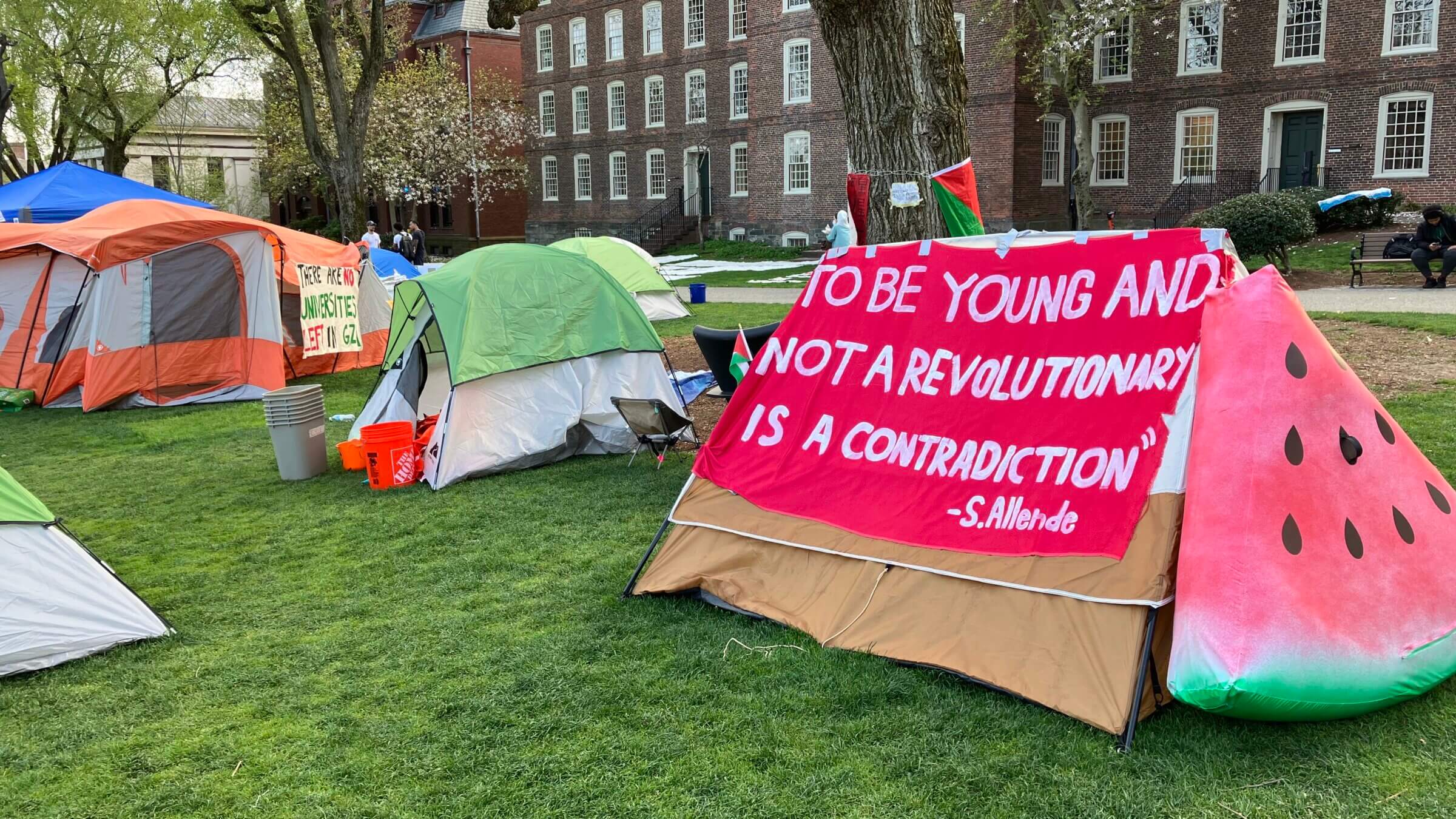
A sign at Brown’s encampment highlights students’ idealism. Photo by Mira Fox
At universities and colleges across the country, police are sweeping through encampments supporting Gaza, trying to clear protesters from the grounds. But at Brown University’s encampment, on the campus’s main green in the middle of Providence, Rhode Island, the biggest drama last Shabbat was that the candles would not stay lit.
This was, more or less, the calm atmosphere of Brown’s encampment for the six days it stood; it was not plagued by the antisemitism, violence or arrests that have dominated headlines about schools including Columbia and the University of California, Los Angeles. There were no clashes with counterprotesters and no police presence. The encampment’s daily schedule included tai chi and a talent show alongside teach-ins and rallies. People tossed frisbees next to the tents.
On Tuesday, the protesting students at Brown reached an agreement with the university’s administration and voluntarily dismantled their encampment.
Life on the Ivy League campus wasn’t always so calm. In the wake of Oct. 7, 61 students were arrested at various sit-ins. Some student groups celebrated Hamas’ massacre. People took pictures of Israeli students on campus and posted on anonymous social media with captions disparaging them as Zionists.
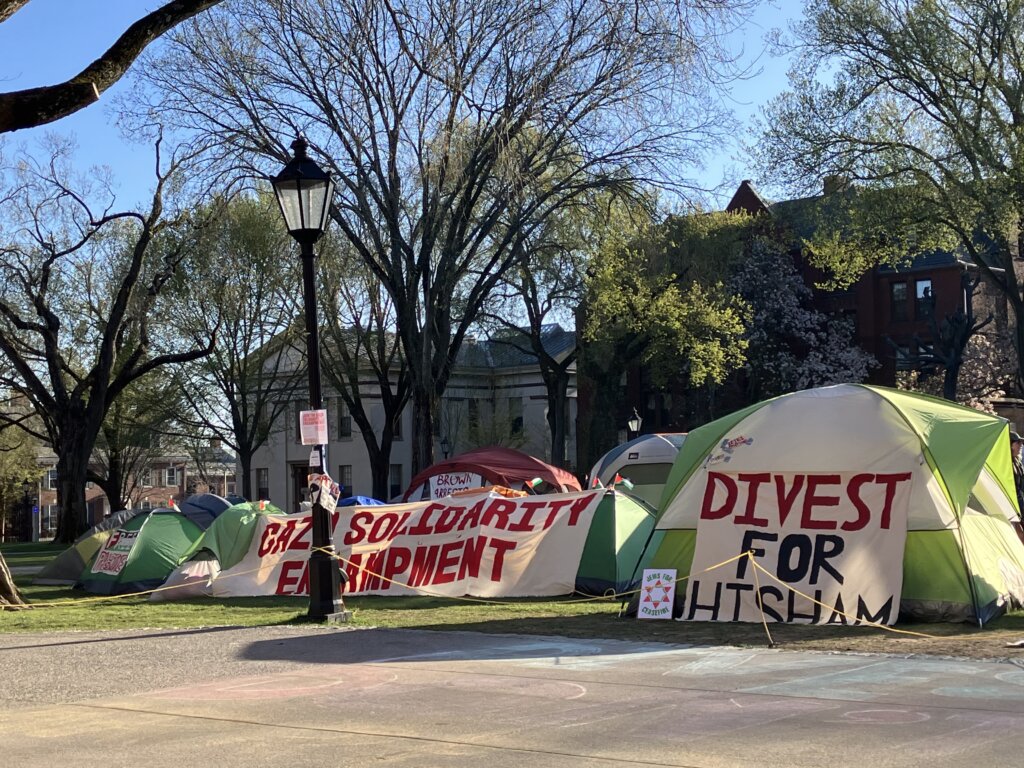
Fractures deepened after a Palestinian Brown undergraduate, Hisham Awartani, was shot in Burlington, Vermont, along with two other Palestinian friends; they were all wearing kaffiyehs. Brown-RISD Hillel put out a statement mourning the shooting, but also castigating “a torrent of antisemitic hatred” online, saying that Hillel’s “support for Israel and Zionist students is unassailable.”
Some Jewish and Israeli students who had previously been involved with Hillel broke ties, calling the email “tone-deaf” and “a disgusting response to a hate crime.” At a vigil for Awartani, a speaker said his blood was on the hands of Zionist students.
But around May’s encampment, that vitriol seemed to have dissipated. Chants were focused on the activists’ demands — divestment not from Israel as a whole, but from companies involved in the oppression of Palestinians — and not on broader statements about Zionism or Israel’s existence. Some of Brown’s most vocal Zionist students, members of opposing campus group Brown Students for Israel, said that they felt safe.
Students told me that the encampment chose not to chant “from the river to the sea” — common at most protests — because one student who was part of the tent group said it made them feel uncomfortable. (The chant did occur once, on the encampment’s final day.)
What enabled this shift? And who planted the seeds for compromise on Brown’s central lawn?
I asked this question of many at Brown, students, faculty and rabbis, and their answers all pointed to a willingness to cross ideological divides. Where protesters at other campuses adopted “do not engage” policies, at Brown, they kept talking.
“On the periphery of the encampment there were a number of students in conversation with one another, some of which I think people might have imagined were unlikely pairs to be having conversations across political differences,” said Jason Klein, the rabbi for Jewish life in the chaplain’s office. “That’s something I think that Brown students can often do well.”
This isn’t, of course, to say that everyone approved of the encampment, or agreed with its demands. Some students and staff at the Brown-RISD Hillel harshly criticize the campus environment. And many activists call for more extreme measures, and more rigid stances — most students I spoke with mentioned more radical factions on campus that don’t fret over upsetting their peers.
But they no longer dominate at Brown.
The encampment maintained a middle ground of sorts, in part due to a monthslong committed dialogue, organized and run by students, to talk through the toughest issues and feelings, and try to understand each other.
And many students said that the relative calm and success of the protest was thanks, in large part, to the deep engagement of Jewish students in the campus’s activist movements.
Jews at the center
The first sit-in for divestment at Brown in November last year was composed, entirely, of Jewish students. In their first statement, in the student newspaper The Brown Daily Herald, the group mourned the murders on Oct. 7 and affirmed its “connection to the amorphous spiritual entity” of Israel, but declared itself anti-Zionist.
Soon after, they named themselves BrownU Jews for Ceasefire Now; many of its members were part of Brown’s encampment. JFCN, as most on campus call it, has organized protests or actions, but also created an independent study course for those grappling with Judaism, Jewish identity and Israel; organized dinners for Jews who clash over Israel; and invited other students to come and ask questions of its members, promising to cast no judgment. It has also hosted weekly Shabbat services — including the one at the encampment — as well as holiday celebrations.
Maddie, a senior with JFCN who spoke on condition that only her first name be used so as not to compromise her employment prospects in the Jewish professional world, said the group hosts large Shabbat dinners and has created an “alternative ritual space” for Jews “who don’t want to feel like they’re praying to a flag.”
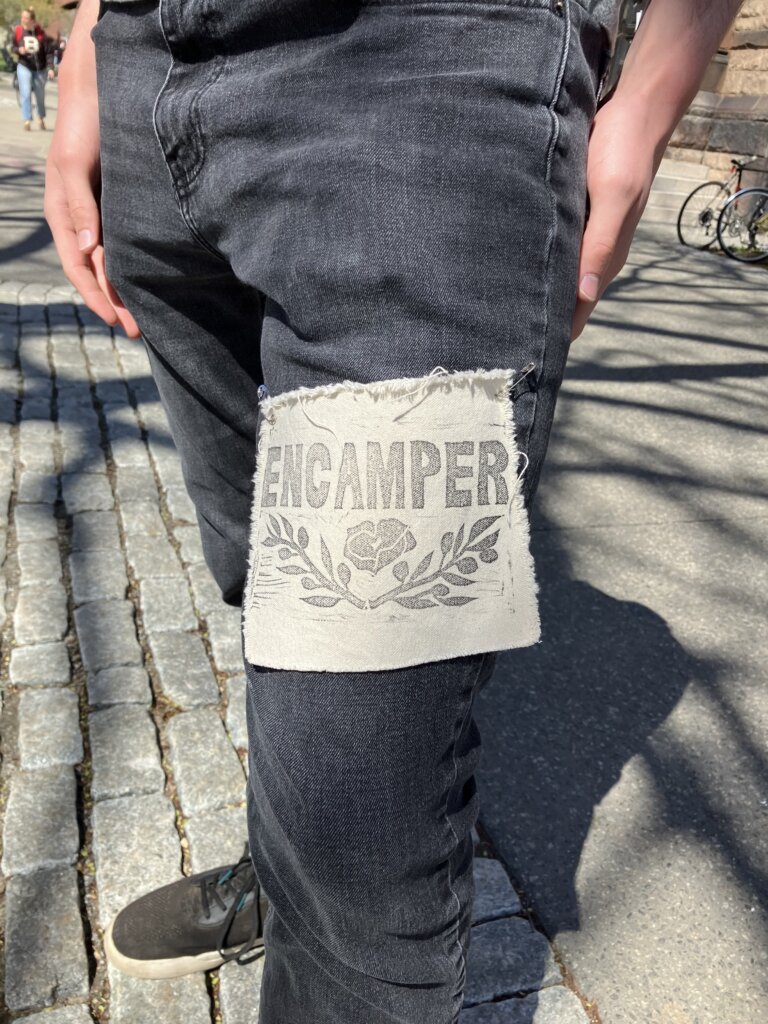
About 24% of Brown’s student body is Jewish, and most of them, according to Rabbi Joshua Bolton, the head of the Brown-RISD Hillel, “exist in a broad center, and in fact they don’t necessarily feel represented by activists on either side of this issue.”
Nevertheless, Jewish students comprise a significant portion — it’s not clear exactly how large — of pro-Palestinian activists on campus. Their deep engagement and leadership seems to have helped insulate the movement from becoming as divisive as on other campuses.
When an outside group from Providence came to the encampment and handed out flyers urging a global intifada over the weekend, students pushed back, saying that was not part of their messaging. They kept their chants focused on divestment and criticism of Brown’s leadership.
“The heavy Jewish presence in these pro-Palestine circles ensures that there will never be the extreme blatant antisemitism,” said Ma’ayan Stutman-Shaw, a first-year student who is not involved with the protests. “And it’s Jews who are really engaged with the Jewish community, not Jews who picked up Judaism on Oct. 10 because they wanted to fight for Palestine — Jews who have been thinking about this constantly, they are the ones who are leading this movement on campus.”
Of course, much of the pro-Palestinian organizing has been led by non-Jewish students as well.
But much of the pushback to pro-Palestinian protests — concerns about antisemitism and what they see as calls to dismantle Israel — have come from Jewish students, who are concerned about antisemitism or who have ties to Israel. And that’s where the leadership of Jewish student activists has come in.
“Jewish students are going to have a better understanding of what will trigger other Jewish students,” said Asher Radziner, a senior who has been leading conversations on campus.
A safety blanket
Many Jewish students I spoke to said the university encouraged conversations among students over Israel and the war, but never convened any that students found inviting.
“It hasn’t really provided those spaces,” said Eiden Spilker, a senior involved with JFCN. “There just haven’t been contexts to engage in good faith.”
So instead, students built their own.
Outside the encampment, while it stood, JFCN students — none of whom were camping on the green — had set up a dialogue space: a blanket, and a painted canvas that said “Questions? Comments? Concerns? Come talk.”
Every day that the encampment stood, at least two students sat there, waiting for people to approach them. The group also facilitated conversations during a student hunger strike in February, when 17 students fasted for eight days to protest the refusal of the Corporation of Brown University, which governs the investment of Brown’s endowment, to hear a proposal for divestment.
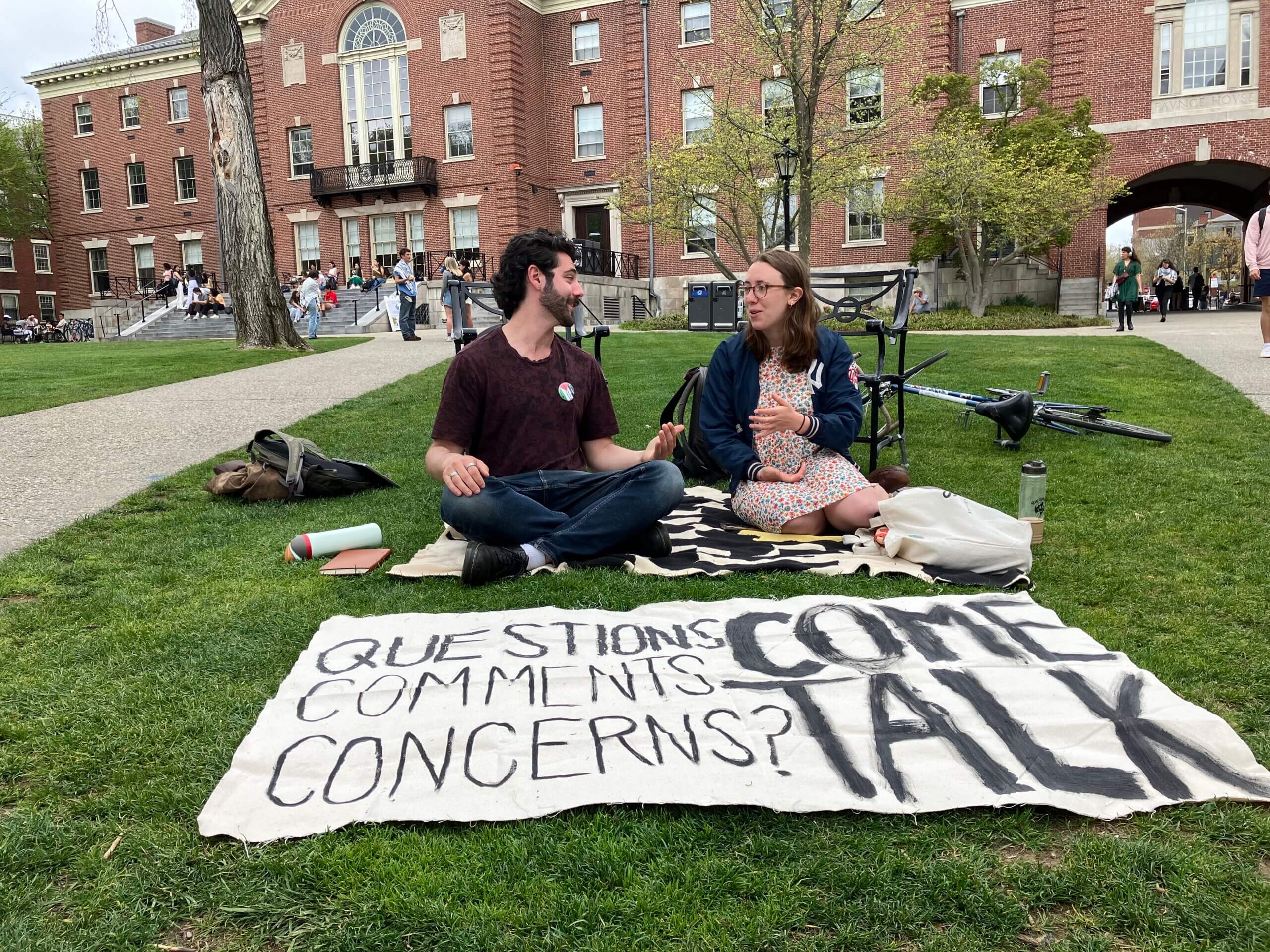
JFCN members said they are looking, especially, to engage with Jewish and Zionist students. Spilker, whose father is a rabbi and whose mother is a cantor, said JFCN understands where they’re coming from.
“We’ve been there, and we’re in a position where we can empathize with that,” he said. “It’s less about trying to convince people and more about hearing them and having dialogue and creating a space that ideally Hillel would’ve created, but because of their ideology and current leadership have not been able to make.”
(“We are a home for every Jewish student,” said Bolton, the director of the campus Hillel, when told of the criticism from some Jewish students. “That doesn’t mean that we’re a home for every type of program.”)
On blanket duty one recent morning, Spilker greeted a student who introduced himself as Kareem, not giving his last name, and had questions. He asked about the use of the term genocide and the impact of divestment. Spilker thought before he spoke, and then drew on theories he learned in classes he’d taken.
“I think it is a question of at which stage do you call it a genocide — is it just at the final stage of mass extermination?” he said.
“That’s a good point,” Kareem responded. “I hadn’t heard that before, that it’s a process.”
Spilker said he’s had all kinds of people come up to him at the blanket: students from the campus pro-Israel group, students from settlements in the West Bank, alumni, faculty, a local imam, worried parents of prospective students who had just taken the campus tours that walked by the encampment multiple times a day.
“That was the main goal in setting this up. Like: We’re here to talk to you, we’re not a threat to you,” he said. “There are people who understand what we’re doing here, or may not fully agree but appreciate what’s happening and appreciate that we’re opening up this space.”
Caught in the middle
One of those appreciative students is Stutman-Shaw. She doesn’t feel comfortable being part of the group, but said she still agrees with much of what JFCN is doing on campus, particularly its work to keep students talking to one another. Those efforts have “made me really proud to go to this school,” she said.
At the same time, the Jewish involvement in the protest movement has put Stutman-Shaw into a difficult position. JFCN hosts a Shabbat service each week with two options for prayer: a Reform service, and a traditional-egalitarian one that uses traditional liturgy but doesn’t divide servicegoers by gender. It’s so popular that it can make it hard for Hillel to field a minyan for its own version of that service, several students told me.
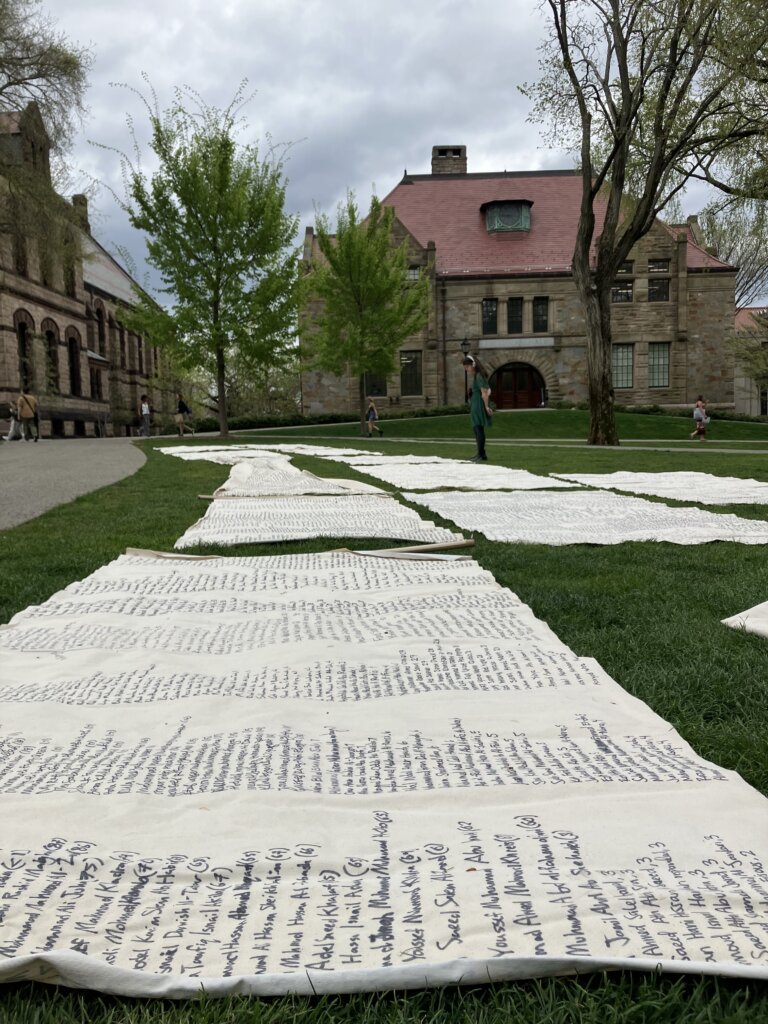
But JFCN’s homemade siddur doesn’t sit right with Stutman-Shaw. It has a disclaimer, explaining that the word “Yisrael” in prayers doesn’t refer to the country of Israel, but to the Jewish people and to the biblical parable in which Jacob wrestles with God. For Stutman-Shaw, that’s not how she views her spirituality; when she prays to Yisrael, she said, she does think of the country, and the time she’s spent there.
That means she often finds herself without her preferred mode of prayer; instead, she usually attends the Orthodox minyan at Hillel.
“JFCN right now is the best egalitarian service that you can find on campus,” she said, citing the passion of the students involved. “Part of me feels really happy for that, and part of me, like, that really breaks my heart because I feel like I can’t really be there fully in who I am.”
Stutman-Shaw is attempting to resuscitate the Brown chapter of J Street U, which describes itself as “the political home for pro-Israel, pro-peace, pro-democracy Americans.” The chapter dissolved in the wake of Oct. 7 because the national organization had failed to call for a ceasefire. She hopes it will be a place where student can both condemn Israel’s actions in Gaza, and support the existence of the state.
Still, while she endeavors to build her own Jewish space on campus, Stutman-Shaw said JFCN has been integral to the success of Brown’s pro-Palestinian movement.
“A lot of Israeli students were leading the protests, a lot of Jewish students with connection to Israel,” she said. “So they were really trying to emphasize the importance of diverse ideological dialogue.”
Dinners across disagreement
Stutman-Shaw has been attending an event called Dinners in Progress, created by two other students who hold differing views on the conflict in the Middle East, that seeks to bring groups of the not-likeminded students together to talk about Israel, Gaza and the atmosphere on campus.
“For the first time since Oct. 7 I see the SJP president, who happens to be Jewish, and someone who is from the Gush talking about Israel,” Stutman-Shaw said, referring to the school’s chapter of Students for Justice in Palestine and a group of settlements in the West Bank. “And that’s so exciting.”
Radziner, who is one of the co-founders, said the dinners arose from the idea that “it would be great to have a dialogue space that wasn’t controlled by the university, that wasn’t run by faculty or adults, but run by students for students — not run by an organization like Hillel or even JFCN.”
The office of student life at Brown put him in touch with another student, Zoey Fisher, and gave them funding to buy dinner, which is always a draw for college students.
In the three dinners so far, a cohort of 14 Jewish students discussed their personal connections to Israel, were able to express frustration with each other and dug deeply into their disagreements.
“It’s very easy for people who feel very strongly about something and want to act on it to get together and take action,” Radziner said. “But often that comes at the expense of continued dialogue with people who disagree with you.”
The dinners, he said, “keep it going.”
‘I’ve had too many bad experiences’
Not everyone feels that the conversation has been quite so welcoming. Rabbi Joshua Bolton, the director of the Brown-RISD Hillel, critiqued what he saw as students holing up in “ideological fortresses.”
“Wisdom is revealed in places where we know very little, where there’s vulnerability,” Bolton said. “And so it would strike me that the opportunity before students at Brown is not to build an encampment that keeps everyone of a differing opinion out, but really embrace the idea of let us go camping together in the wilderness.”
He blames the Brown faculty in part for building ideological fortresses and setting a bad example for students.
In many ways, Hillel has been the target of the worst of the ire from protests. Bolton and the assistant director of the Hillel, Molly Goldmeier, received death threats several months ago.
“It’s just very hard for me to imagine what I’ve endured,” he said, “and there not being a major campus revolt on account of it.” he said. The campus, he posits, would be outraged had the head of the Brown Center for Students of Color received such threats.
“I think that kind of reflects where students are at right now,” he added.
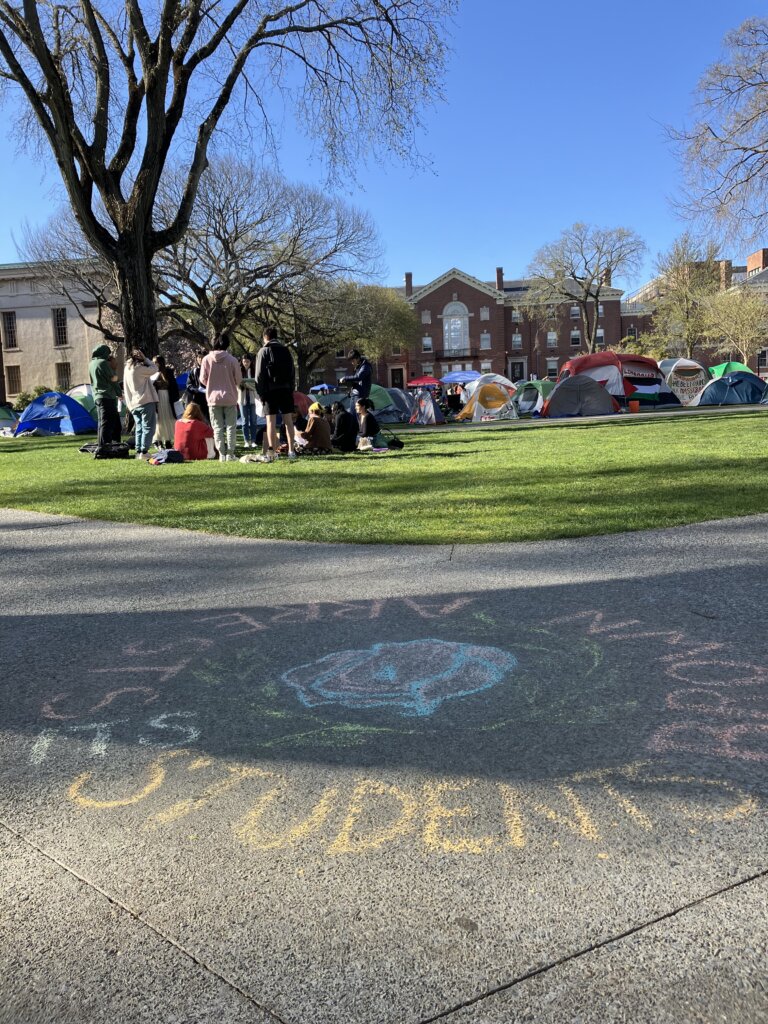
Teddy Horowitz, a senior, said he, too, feels unwelcome on campus because of his Zionism; he said he’d lost numerous friendships because of his love for Israel and his membership in the campus pro-Israel group, Brown Students for Israel.
Horowitz largely agrees with the activists’ demands for a ceasefire and an end to Israel’s occupation, but is deeply concerned about antisemitism within the movement. He said the Brown SJP chapter had expressed admiration for Hamas, and that he’s seen antisemitism rise on campus social media. He also saw no place to mourn Israelis murdered in the Oct. 7 attack because of the dominance of pro-Palestinian activism on campus.
Many of his activist classmates fall into two groups, he said. “There are the Jews and students who think Oct. 7 was a victory, and there’s the activists who are willing to put up with that,” he said. “And I don’t want to deal with either group anymore; I’ve had too many bad experiences.”
Horowitz turned to the campus Hillel and Chabad, where he found community with like-minded friends. But he remains discouraged by what he sees as echo chambers on campus.
To combat this, he founded a new publication, the Brown Jewish Journal. “When the Jewish Journal started, one of the editors was an anti-Zionist and I was really suspicious of him at first,” Horowitz recounted. But, as they began to read and edit each other’s work, that changed. “Now I really look forward to talking about Israel-Palestine with him,” he said.
Horowitz, who spoke to me in the days before protesters and the university struck an agreement to dismantle the encampment, said the climate on campus had improved since the weeks after Oct. 7.
“I’m really pleasantly surprised with how well this protest is going,” he said of the encampment. “Recently I’ve come to the conclusion that these people might be pretty chill.”
But he still feels “betrayed” by the campus community. “I love the outpouring of empathy for Palestinians — they need it!” he said. “I just wish some of the empathy was directed our way as well.”
A campus, less divided than it looks
Every student I spoke to said they think even the groups at opposite ends of the ideological spectrum on Israel actually, well, mostly agree.
“You’ll find a lot more in common with BSI members and JFCN members than either of them would ever admit,” said Stutman-Shaw.
But they did admit it. When I spoke with them, both BSI and JFCN members made the same point — that most of them agree on a lot of points, including criticism of the Israeli government, horror at the deaths of civilians in Gaza and a desire for a ceasefire.
Talking with students from across the campus’s Jewish community, the divides largely came down to details — students who want a ceasefire, but are uncomfortable with using terms such as “genocide” or “anti-Zionist.” Or students who are reluctant to try to find common ground or engage with students who reacted to Oct. 7 in a way that upset them.
But many of them, on all sides, are trying to push through their discomfort to understand each other, even when it’s difficult.
“Movements are imperfect,” Radziner said. “Once you understand that you’re all working towards the same goal, with different ways of getting there, it lets you start to not overlook but push through the parts that you disagree with or find challenging.”
That’s what Klein, the rabbi in the chaplain’s office, hopes will define Brown’s protest movement.
“I was really proud that these students were still really in it, and trying to make it imperfect for everyone,” he said. “Everyone gets to be uncomfortable, everyone gets to learn.”















